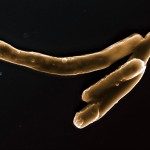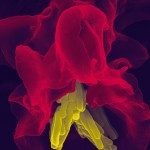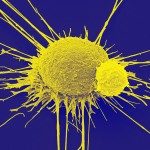Link to Pubmed [PMID] – 22067212
Hum. Immunol. 2012 Feb;73(2):196-200
The NAIP gene encodes an intracellular innate immunity receptor that senses flagellin. The genomic region containing NAIP presents a complex genomic organization and includes various NAIP paralogs. Here, we assessed the degree of copy number variation of the complete NAIP gene (NAIPFull) in various human populations and studied the functional impact of such variation on host cell fate using Legionella pneumophila as an infection model. We determined that African populations have a NAIPFull duplication at a higher frequency than Europeans and Asians, with an increased transcription of the gene. In addition, we demonstrated that a higher amount of the NAIPFull protein dramatically increases cell death upon infection by L. pneumophila, a mechanism that may account for increased host resistance to infection. We postulate that the NAIPFull gene duplication might have been evolutionary maintained, or even selected for, because it may confer an advantage to the host against flagellated bacteria.









